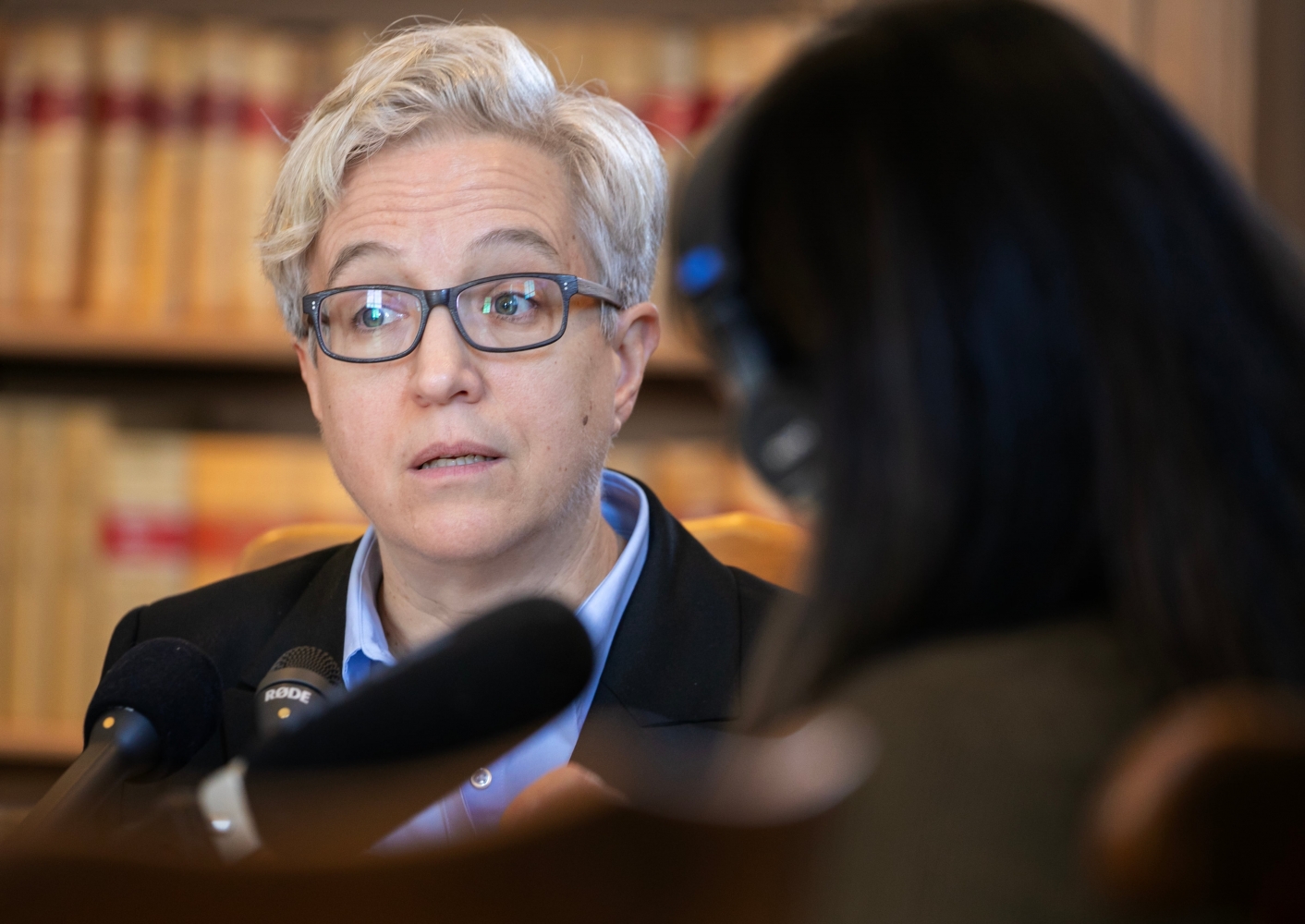

Published on: 10/22/2025
This news was posted by Oregon Today News
Description
President Donald Trump announced he was sending National Guard troops into “war-ravaged” Portland three days before Gov. Tina Kotek’s 59th birthday.
In some ways, he could not have sent a better gift.
As Kotek prepares to launch a reelection bid, she is taking on a foe whom many in her base loathe more than they love any Democrat. In cable news appearances, press conferences and even a podcast, the governor has pushed back against Trump in her typically calm, polite style.
“The administration is being dishonest and these actions that deploy troops are a gross, un-American abuse of power,” Kotek said Monday, after an appeals court panel cleared the way for Oregon National Guard members to make their way into the city. “The fight is not over.”
Supporters see a politician who’s found her footing.
“This plays to her strengths,” said state Rep. Dacia Grayber, D-Portland. “She’s smart and strategic and calm and levelheaded. This is her moment.”
It’s a welcome pivot for a governor for whom galvanizing accomplishments have been hard to pin down – and who struggled openly to pass a major road-funding bill in recent months.
With Kotek now eyeing another for years in office, an interesting divergence has emerged: It seems most everyone expects her to win another term, even if many aren’t sure she deserves one.
Interviews with dozens of lawmakers, lobbyists, businesspeople, bureaucrats and activists over the last month reveal a picture of a governor who has increasingly perplexed fans and delighted Republican rivals. Both groups struggle to point out signature achievements of Kotek’s first 2.5 years.
“She was an excellent [speaker of the House], and I haven’t seen that translate as governor,” said one business lobbyist who was granted anonymity to speak candidly because, like many others interviewed, they did not want to cross Kotek. “There has been a lack of her presence on key issues and I don’t understand why. It feels like something has changed.”
One change is obvious: In March 2024, not long after Kotek’s administration finished a first year that many praised, most of her chief brain trust left. Some say the governor’s office has seemed adrift ever since.
But Kotek still has her boosters. The governor has kept a relentless focus on three issues: housing, education, and behavioral health. And while dramatic improvements are hard to find, some close watchers believe Kotek has seeded the ground for progress.
“She has set the table,” said Mary Kyle McCurdy of 1000 Friends of Oregon, a nonprofit land use group that has at times battled Kotek over her housing plans. “She has done a great job of setting the table for housing production and trying to clear the hurdles for it inside our cities and towns.”
It’s a sentiment that figures to be a theme in Kotek’s reelection campaign, the first glimmers of which have begun to show up in her political contributions. She has raised nearly $1 million this year, including a recent $100,000 check from IBEW Local 48, an electricians’ union.
“I just know there’s a lot of work to do yet,” Kotek said in a recent interview, saying she will make an announcement on her election plans by year’s end.
“I feel like we’re pretty splashy”
When an announcement does come, the governor’s team will be ready for criticisms that are sure to follow.
Since taking office in January 2023, Kotek has battled a housing shortage in the state. But Oregon is building fewer new units than it was when she was sworn in, and less than half of the ambitious goal of 36,000 units a year she set in her first week on the job.
Kotek has made improved outcomes for K-12 students another signature issue. The state’s standardized test scores and chronic absenteeism rates remain among the worst in the nation.
The governor’s other major focus, the state’s inability to address the sheer volume of people with mental health or addiction issues, shows a little more progress. The state has added treatment beds in recent years, and hundreds more are expected to open by the end of 2026. But many Oregonians who’ve grown tired of seeing people in crisis on the street corner aren’t feeling the change.
This lack of tangible results has left many underwhelmed.
“We’ve got potential, we just need leadership and people to say, ‘Hold onto my cape,’” said Greg Goodman, co-president of Downtown Development Group, a major property owner in downtown Portland. “I don’t see that in her right now.”
Goodman is a rarity: a person other than a Republican politician or political consultant willing to speak on the record with criticisms of a Democratic governor known for political retribution. Most people contacted for this story would only offer their reflections on background.
Among the more than 40 people OPB spoke with — Republicans and Democrats alike — there was a consensus that the governor is smart, hard-working and driven to take on intractable issues. There’s also a sense among some that she has underperformed.
“It’s hard to point at any statistic across the board where we’re doing better today when we were when the governor was elected,” said Senate Minority Leader Bruce Starr, R-Dundee.

Asked recently about this sentiment – and the lack of splashy political wins – Kotek seemed mystified.
“What does splashy look like?” she said. “I feel like we’re pretty splashy.”
The promise of her governorship, Kotek argues, was never instant gratification.
“When I ran for this office…it was about staying focused on the top priorities for the state and making progress also with the understanding that these aren’t things you solve overnight,” she said. “We have to put things in place that will get us where we want to go over the long term.”
A staff shakeup’s lingering impacts
The governor’s critics focus as much on the topics she’s neglected as those she’s leaned into.
Nowhere was that more pronounced this year than in the fractious debate over how to fund the state’s roads.
Kotek was hard to find on the subject over the course of the five-month session, which concluded with the dramatic collapse of the Democrats’ funding bill.
“The legislative leaders consistently said, ‘We have a plan. We got this,’” Kotek told OPB. “I joined a lot of folks being surprised that what they thought was going to happen did not happen at the end of session.”
Capitol denizens don’t buy it. They wonder why the state’s chief executive was disengaged on the session’s hottest topic. And almost without fail, they seem to hit on one incident: a sudden loss of her most trusted advisers.
In March 2024, Kotek fired Andrea Cooper, her well-respected, well-connected chief of staff. Two other senior aides, Deputy Chief of Staff Lindsey O’Brien and Special Advisor Abby Tibbs, left in protest. Kotek’s communications director and one of her top attorneys quit the next month.

It would be a seismic shakeup for any governor’s office, but it was the source of the earthquake that observers say has had a lasting impact. Cooper, Tibbs and O’Brien’s departures came after all three women raised forceful objections to the increasing role First Lady Aimee Kotek Wilson was playing in the administration.
Kotek Wilson’s role got enough scrutiny following the staff revolt that Kotek backed off of plans to create a formal Office of the First Spouse. But little else has changed. Kotek’s spouse continues to be a key presence in her wife’s administration.
“There’s not an issue,” Kotek said of her wife’s role.
The first lady, who once worked as a social worker, is one of her wife’s most trusted advisers. As a volunteer, she chairs a new council on retaining and recruiting behavioral health workers.
“She’s an expert in this area and she’s doing a great job,” Kotek said. “I think it would be dereliction of duty, for me not to tap everybody to do something on this top priority.”
The implication is clear for both current staffers and anyone who might be drawn to work for Kotek: Cross the first lady at your peril.
“Who’s lining up to enter the office after a break like that?” said one Democratic consultant. “It scares people away from coming.”

Instead of wooing a wave of top talent, Kotek has largely promoted staffers from within. Several Democrats OPB spoke with said that’s created a culture of policy wonks atop the administration, where more visionary thinkers or political operatives would be a better fit.
At times, blind spots have been hard to miss.
When lawmakers failed to pass a transportation bill this year, Kotek finally assumed control of the issue. And she wasted no time scolding the Legislature.
“I don’t care how tired you are, I don’t care what your vacation plans are,” Kotek said on June 28, the day after the session adjourned. “We are going to solve this. You’re going to be spending a lot more time with me.”
The governor wound up crafting a proposal of her own, and called a special session on Labor Day Weekend. But Kotek wasn’t in Salem to be grilled when her road funding bill came up for a hearing.
“We’re all here doing this work,” then-state Sen. Daniel Bonham, R-The Dalles, said at the time. “It is important enough for us to have given up our Labor Day weekend. Here we are. And she’s not here.”
The same day, a conservative social media account posted a photo of Kotek out shopping with her wife in Astoria, where they were living at the time. Even allies wondered if Kotek had lost the plot – and why she didn’t have staffers to help steer her away from an obvious optics blunder.
The governor had little patience for questions about the matter in a recent interview.
“I literally took an hour break to go buy some bread,” she told OPB. “I had been watching the hearings, talking to legislators. I’m not in the Legislature. That hearing was for legislators.”
Kotek maintains her staff hasn’t “missed a beat” in light of last year’s departures.
“People come and go,” Kotek said. “We have a great team.”
Doing hard things
Kotek and her allies insist good things are coming for Oregon.
In behavioral health, Kotek has pried loose state funding to bolster Oregon’s threadbare network of providers for mental health and addiction crises. To aid in that work, she ordered up a study laying out in grim detail how yawning the state’s shortage was. (It found the state needs almost twice the treatment beds it has). And the governor’s office was one voice this year pushing for a contentious legal change that will make it easier to force people in serious mental health crises into treatment.
“I’ve been doing this 17 years. She’s one of only two governors who did more than just say words,” said Chris Bouneff, executive director of the National Alliance on Mental Illness’ Oregon chapter, who also praised former Gov. Ted Kulongoski. “In between we had people who had the rhetoric down but didn’t do anything substantial – in fact did so little as to set us back.”
On schools, the governor has worked to revamp how children are taught to read, secured money for summer learning to help students still struggling to catch up from the COVID-19 pandemic, and pushed a new law giving the state more authority to intervene when school districts persistently underperform. When lobbying by districts killed a bill to ban cell phones in schools, Kotek issued an executive order making the change.
But Oregon’s education system still earns an incomplete. The state’s 4th and 8th graders have among the country’s worst average test scores in math and reading, according to one assessment. More recent, Oregon-specific testing suggests student outcomes are improving by a small amount, but still trailing test results before the pandemic.
“We have a very clear set of wins in the education venue that will set us up for future success, and it will take time,” Kotek said. “It’s the same thing on housing and homelessness.”
No issue has motivated Kotek like housing. During her 2022 gubernatorial campaign, Kotek’s work on a bill that made it more difficult to sweep homeless encampments earned her a cutting nickname from one rival: Tent City Tina.
As governor, Kotek has steered a massive amount of money toward homeless shelters and rental assistance. She has developed regional networks of groups to respond to homelessness in their corners of the state. And she’s passed policies making it easier to expand city boundaries to add housing, and eased zoning codes in cities to allow different housing types.

Yet both housing development and homelessness are headed in the wrong direction. Last year, Oregon added 14,621 new housing units, according to the U.S. Census Bureau, down from 20,321 the year before Kotek took office.
The governor’s self-imposed goal of reaching 36,000 units a year was always seen as ambitious. These days it can seem hopeless.
Kotek’s office and supporters say broader trends – including high interest rates and a shortage of construction workers – are to blame.
“I don’t think it’s fair to look at the fact that an ambitious target of 36,000 hasn’t been met given the national issues going on,” said McCurdy of 1000 Friends of Oregon. “We are not unique.”
Critics say Kotek is reaping what she sowed as speaker, when she helped pass laws enacting rent control and allowing cities to mandate affordable housing in some new projects. They have called on Kotek to eliminate regulations they say have choked off housing projects.
“My disappointment with her is that she calls it a crisis, but we’ve never treated it as a crisis,” said state Sen. Dick Anderson, R-Lincoln City, his party’s chief expert on housing in the Senate.

Homelessness has also increased during Kotek’s time in the governor’s mansion, rising more than 13% between January 2023 and January 2024, according to the most recent federal statistics.
Kotek’s office touts the thousands upon thousands of people who receive shelter and rent assistance from state programs as proof her approach is making a difference. And Kotek helped spur the city of Portland to suspend some fees on developers that could yield more housing – part of a deep dive into the woes of Oregon’s largest city she facilitated.
“She says this a lot: She doesn’t want to not do things just because they are very hard or because the headwinds are very strong,” said Matt Tschabold, Kotek’s housing and homelessness initiatives director. “That’s even more a reason to do things.”
But in tying herself so thoroughly to the state’s most difficult issues, Kotek risks being associated with the problems that most irk her electorate.
“Everything she is focused on has gotten worse,” said one political insider who has worked on state politics for decades. “It’s not a complicated analysis.”
Political tailwinds?
There are some bright spots for the governor as she prepares to run for a second term.
Her polling among Oregonians has improved of late, though she’s still among the country’s least popular governors. A July survey from the Portland firm DHM Research found 44% of Oregon adults had a positive impression of the governor, versus 46% with a negative impression. An ongoing recall campaign against Kotek, filed by a La Pine resident, has shown few signs of viability.
The numbers may not be great, but no one is betting against Kotek.

Nearly every person interviewed for this story, no matter their party, predicted fierce headwinds for Republicans next year. That’s both a reflection of Trump’s deep unpopularity among many Oregonians and a normal expectation in any mid-term election where the GOP controls the White House and Congress.
“It would take a very unique Republican to get elected statewide in Oregon,” said Chris Shortell, a professor of political science at Portland State University. “I’m not even sure a unique candidate could do it, given the nationalization of politics where even state-level politicians are much more closely associated in the public’s mind with the national political parties.”
The Republican gubernatorial field is far from settled, but currently features Marion County Chair Danielle Bethell as its most likely frontrunner. Former Republican nominees for governor Christine Drazan (2022) and Chris Dudley (2010) are among those who could shake up the race if they decide to jump in. The last Republican governor in Oregon was Vic Atiyeh, who left office in 1987.
Another term may feel likely for Kotek, but a successful one is far from assured.
A major piece of Kotek’s strategy has been spending big on her core issues. But Oregon is on the precipice of a major budget crunch, following reductions in state revenue and federal funding brought on by Trump’s so-called “One Big Beautiful Bill.”
For months, Democrats have been warning of difficult decisions ahead. Layoffs, fewer services, and benefits reductions are all on the table.
If the governor has had trouble securing results in a time of relative plenty, the oncoming budget woes may make it even harder.
Kotek says she’s the right person “to provide mentorship and guidance” to the Legislature during tough times.
“We have lawmakers who are talented – maybe a little green, but talented,” she said. “We’re going to figure this out.”
Whether lawmakers will be open to the tutelage is another question. Kotek spent a highly successful decade as a speaker moving her agenda by any means necessary. Often she could sway lawmakers with the force of an argument. Sometimes she needed to twist arms.
That’s harder to do as governor.
“She doesn’t convene. She’s trying to rule,” said Bonham, the former Republican state senator, who is headed to the Trump administration. “She needs partners in the Legislature. She needs allies and she does nothing to foster the relationships.”
For the time being, Oregon’s budget has taken a backseat to worries of federal authoritarianism for many in Kotek’s base.
Trump’s insistence on sending National Guard troops to Portland has helped put Oregon – and Kotek – in the national spotlight. After spending much of the year being strategically reserved when it comes to criticisms of the president, Kotek is growing more comfortable speaking out.
“Federal agents on the ground are essentially instigating conflict with folks who are lawfully protesting,” Kotek told reporters Monday, describing ongoing clashes between a small amount of protestors and federal officers at a U.S. Immigration and Customs Enforcement facility in Portland. “We have a lot of individuals who are there playfully saying, ‘We don’t agree with the federal government.’ Yet ICE agents are taking one step further and going out and shooting off tear gas.”
That resistance has won praise from even skeptical Democrats. But it’s also prompted worry that a fight with the feds will sap the governor’s attention from local issues that desperately need it.
If Kotek does win another term – as she’s getting ready to make a pitch for – her boosters say it needs to be punctuated by bold progress.
“This would be her last term as governor,” said state Treasurer Elizabeth Steiner, a Democrat who’s already agreed to endorse Kotek. “She won’t have another to push forward on some thorny issues. I really hope she uses it.”
News Source : https://www.opb.org/article/2025/10/22/oregon-gov-tina-kotek-major-issues-progress-reelection-bid/
Other Related News
10/22/2025
Redwood Parks ConservancyColorful sea stars thriving in the intertidal zone a reminder of ...
10/22/2025
Fiona Bean LLC From the women-owned Three Sisters Apothecary in California these rich body...
10/22/2025
How Producers Got Bang for their Buck in Oregon on Night Always Comes Criminal and More
10/22/2025
Officials have identified more than 1000 available hotel rooms plus additional rental opti...
10/22/2025












